For a generation excluded, lawful dissent is redundant
Article published: Tuesday, December 14th 2010
Among the predictable stream of condemnation for the ‘violent’ protestors on the December 9 demonstration against tuition fees, it was pleasing to hear David Cameron say that it was time to stop talking about them as a “small minority.” “There were,” he said, “quite a lot of people who were hell bent on violence and destroying property.”
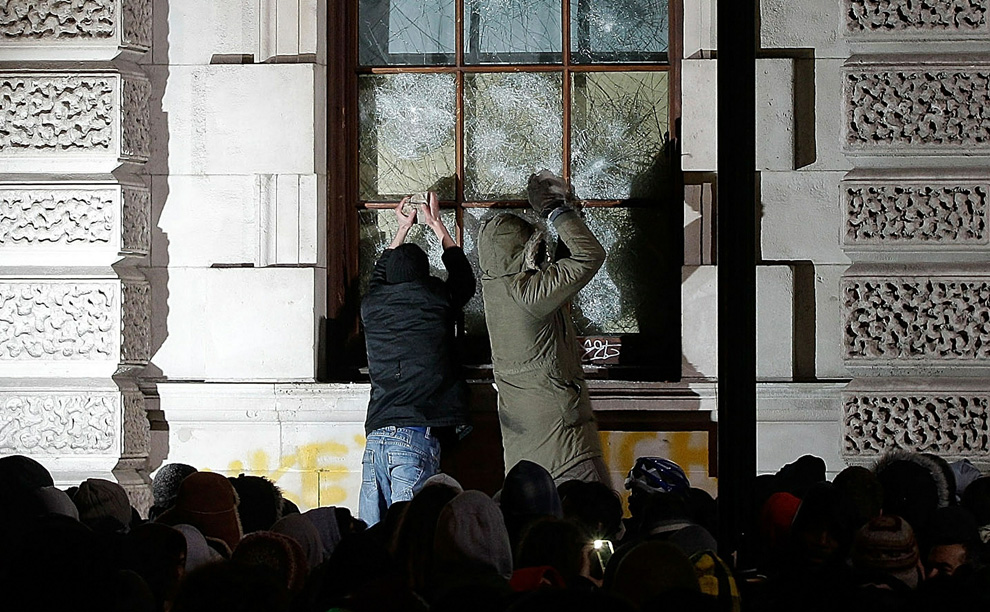 Cameron is right: ‘Violent’ protest is going viral, a meme spreading like wildfire through the younger generation. If you weren’t at the demonstration look at the faces on television footage of parliament square, and see that the people throwing items and attempting to surge through police lines are not the ‘usual suspects.’
Cameron is right: ‘Violent’ protest is going viral, a meme spreading like wildfire through the younger generation. If you weren’t at the demonstration look at the faces on television footage of parliament square, and see that the people throwing items and attempting to surge through police lines are not the ‘usual suspects.’
Thousands of otherwise placid young people are enraged enough to risk both a criminal record and a severe beating. Judging by the events of the past month, their ranks are growing. Yes, the protests were violent and there is no need to shy away from this given the far greater structural violence being perpetrated by the Coalition as they set about dismantling the welfare state with spending cuts that will disproportionately affect the poor.
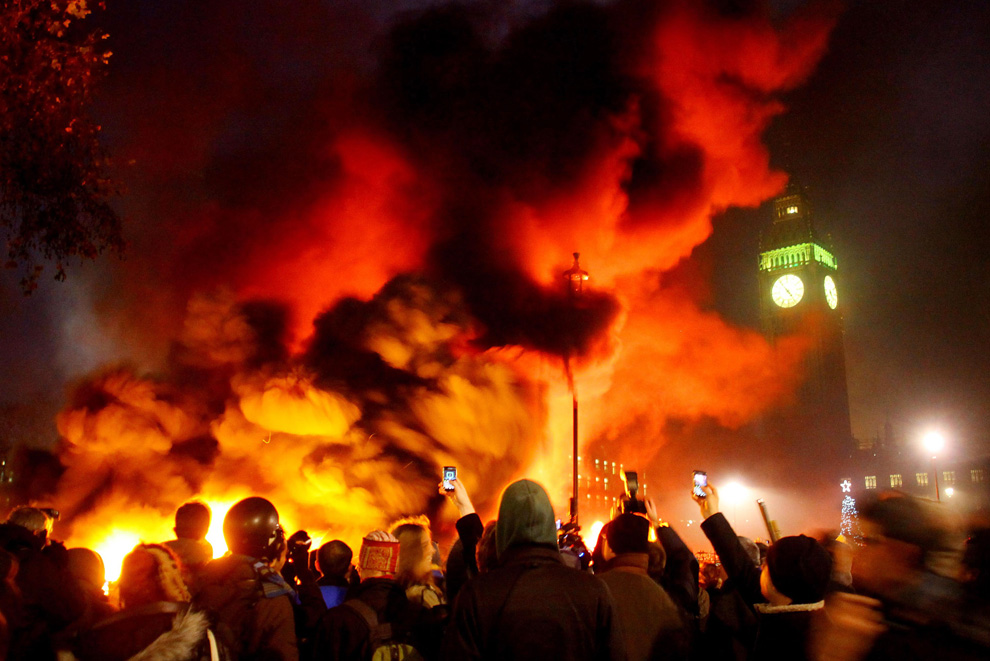 British demonstrations, particularly student demonstrations, had until a month ago been notable by the standards of our continental neighbours for their docility, obedience and passive respect for authority. Not any more. The sudden turn around, speaks not just about the anger at higher education reforms or police brutality, but about the state of democracy in the UK. This outpouring of visceral pent-up hatred towards the establishment in all its symbolic manifestations – from the police to Prince Charles, the Churchill (the last British Government Minister to use the army on a protest) statue to Topshop – expresses the disillusionment of a generation who have learnt by experience that the political system does not work for them.
British demonstrations, particularly student demonstrations, had until a month ago been notable by the standards of our continental neighbours for their docility, obedience and passive respect for authority. Not any more. The sudden turn around, speaks not just about the anger at higher education reforms or police brutality, but about the state of democracy in the UK. This outpouring of visceral pent-up hatred towards the establishment in all its symbolic manifestations – from the police to Prince Charles, the Churchill (the last British Government Minister to use the army on a protest) statue to Topshop – expresses the disillusionment of a generation who have learnt by experience that the political system does not work for them.
“Don’t smash windows or fight the police,” young people were told by their teachers and parents, “vote for a party that will represent your views in parliament.” In the wake of the Lib-Dem U-turn over fees, a successor to New Labour’s own broken promises on the issue when they were in government, such sentiment looks naive at best. Political parties will lie for your vote, over and again, is the reality which young would-be voters face.
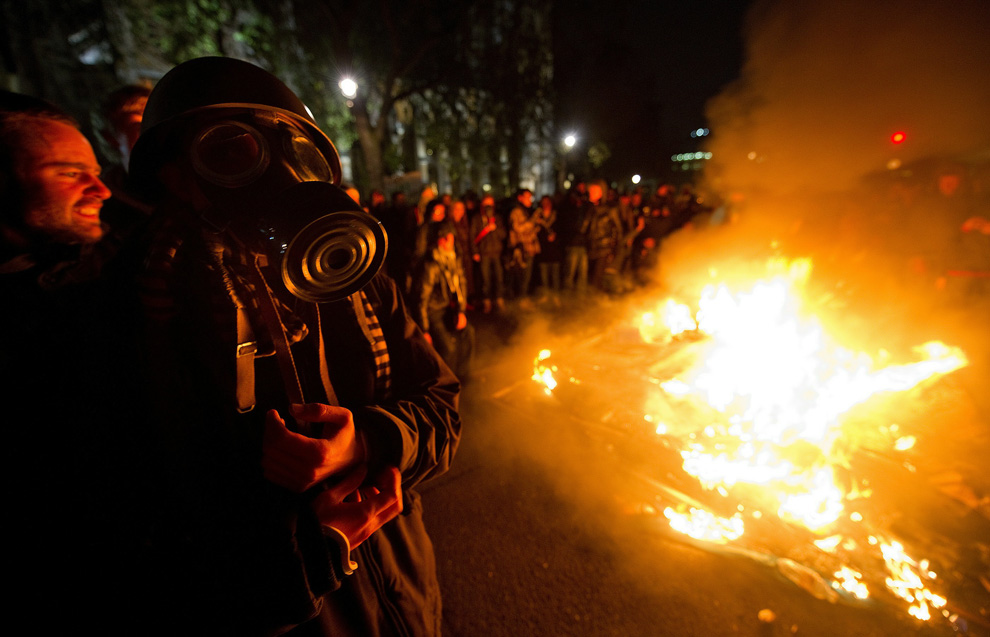 “If you ignore official channels, protest peacefully with a moderate line to gain mass public support.” Older students on the protest will have come of age politically watching the Blair government stubbornly ignore public opinion over the decision to go to war with Iraq, in the face of the largest protests in British history. Those perhaps too young to remember this period vividly are certainly aware of its significance. Stop the War Coalition pursued exactly this protest strategy, and failed to do so much as put a stumbling block in the path to war. Prior to the vote, the Liberal Democrat Lord Paddy Ashdown had urged his party members to vote against public opinion on the fees, saying, “At the moment they (the public) are just not listening. Nick (Clegg) could deliver the Sermon on the Mount. They are just not listening.” The echoes of Iraq were loud and clear: Politicians ultimately have no duty to their constituents, they rule over the ignorant masses, not represent them.
“If you ignore official channels, protest peacefully with a moderate line to gain mass public support.” Older students on the protest will have come of age politically watching the Blair government stubbornly ignore public opinion over the decision to go to war with Iraq, in the face of the largest protests in British history. Those perhaps too young to remember this period vividly are certainly aware of its significance. Stop the War Coalition pursued exactly this protest strategy, and failed to do so much as put a stumbling block in the path to war. Prior to the vote, the Liberal Democrat Lord Paddy Ashdown had urged his party members to vote against public opinion on the fees, saying, “At the moment they (the public) are just not listening. Nick (Clegg) could deliver the Sermon on the Mount. They are just not listening.” The echoes of Iraq were loud and clear: Politicians ultimately have no duty to their constituents, they rule over the ignorant masses, not represent them.
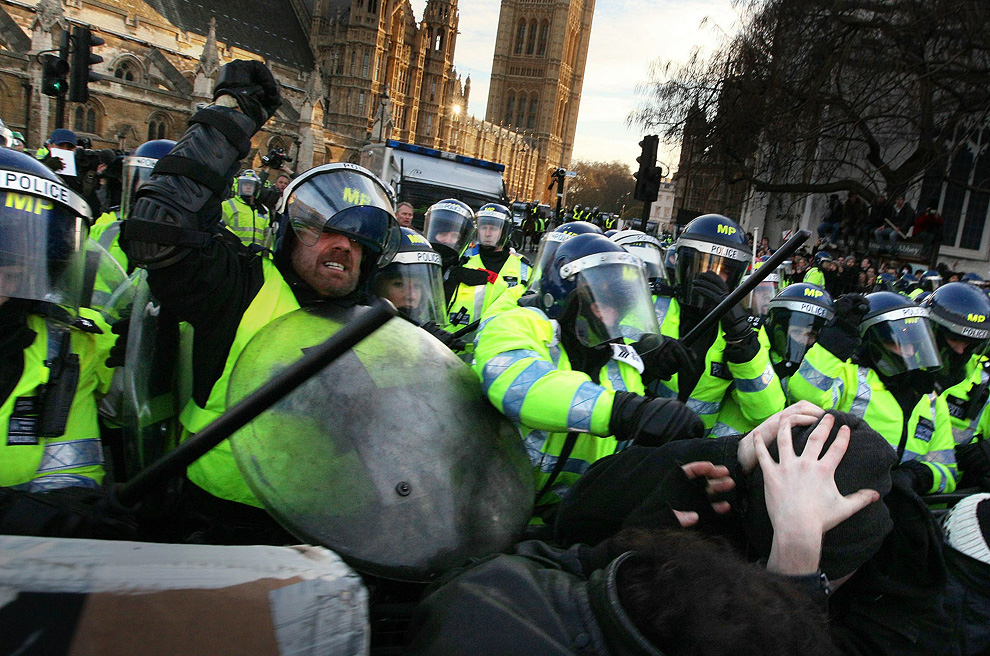 The student movement is learning to discard conventional union activity. The NUS lacks the stomach for the fight, refusing to call protests when the moment demanded it and, in Aaron Porter’s stomach-churning media performances, turning on its own members rather than risking the ire of the establishment. Organisation networks aside separate from official NUS channels have rapidly grown, and the NUS’ absurd glow-stick vigil on the banks on the Thames – designed to draw protestors away from confrontation – attracted barely a few hundred people. The one NUS delegate to speak at the pre-march rally in Bloomsbury, had to be introduced by the MC with an apology to the crowd; “He’s from the NUS, but he’s OK.” Shouts of “New Labour scum” greeted him.
The student movement is learning to discard conventional union activity. The NUS lacks the stomach for the fight, refusing to call protests when the moment demanded it and, in Aaron Porter’s stomach-churning media performances, turning on its own members rather than risking the ire of the establishment. Organisation networks aside separate from official NUS channels have rapidly grown, and the NUS’ absurd glow-stick vigil on the banks on the Thames – designed to draw protestors away from confrontation – attracted barely a few hundred people. The one NUS delegate to speak at the pre-march rally in Bloomsbury, had to be introduced by the MC with an apology to the crowd; “He’s from the NUS, but he’s OK.” Shouts of “New Labour scum” greeted him.
An obsession with placating the mainstream media has also been a limiting force on the militancy of past protests, but this too is being ditched. The media have demonstrated that they will almost entirely ignore protests 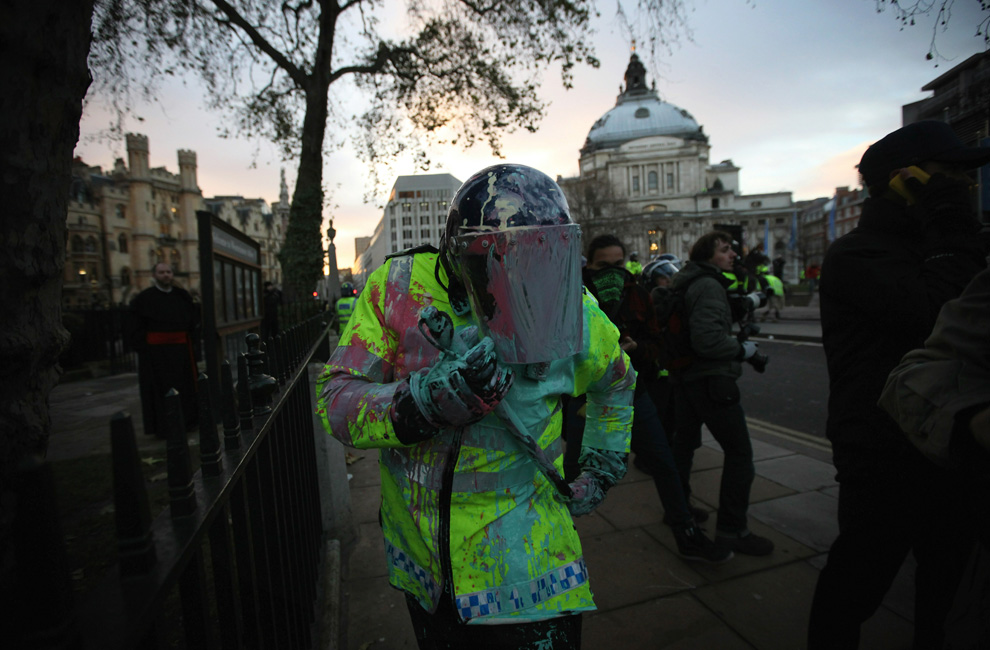 which do not involve lawlessness, and blanket-condemn those that do. There is, experience has shown, simply no need to play the media game in chasing the chimera of ‘good publicity’, better just to make a display of anger in the most unambiguous terms.
which do not involve lawlessness, and blanket-condemn those that do. There is, experience has shown, simply no need to play the media game in chasing the chimera of ‘good publicity’, better just to make a display of anger in the most unambiguous terms.
All of this means that lawful, ‘peaceful’ protest is redundant for movements that want to make an impact. The official political process is too compromised. This is the fire ignited by the spark of higher education reform, and it will not stop burning for some time. Though the bill has passed, the protests have had an impact. The final version is a watered down version of the original presented by the Browne Review. Lib Dems have rebelled, abstained and resigned in a manner that will create lasting fault lines in the party. And lest we forget, the vote was desperately moved forward in an attempt to get the matter over with before the protest movement grew any further.
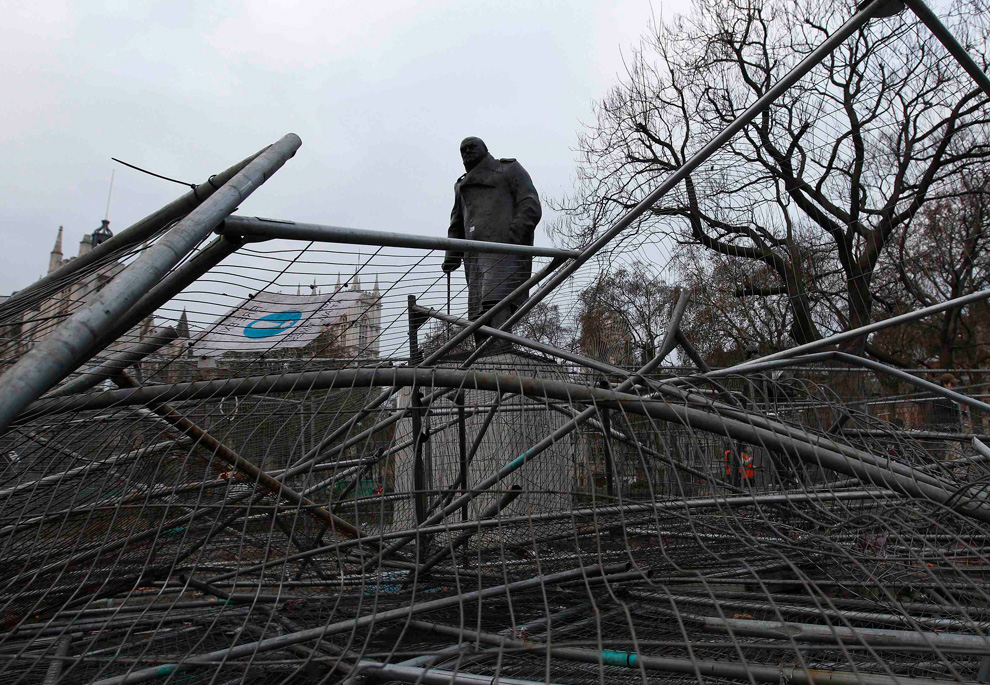 All of this has been driven by the spectre of large-scale revolt. The major question now, is do the tattered remains of the British left and the other sectors of British society to be damaged by the cuts, have either the courage or the capabilities of the students in making their presence felt?
All of this has been driven by the spectre of large-scale revolt. The major question now, is do the tattered remains of the British left and the other sectors of British society to be damaged by the cuts, have either the courage or the capabilities of the students in making their presence felt?
Archie Portland
More: Cuts, Education, Opinion, Policing
Comments
-
Yes! Let’s just hope it spreads to workers too and we see some real direct action against these cuts… no, the whole system.
Comment by angry student on December 14, 2010 at 3:49 pm -
I totally agree – now is the time to rise up – students and workers in solidarity
Comment by Simon on December 14, 2010 at 7:37 pm -
The unions’ reaction to the cuts has been disgraceful. For the students the NUS has acted as a buffer to absorb tension and energy, and misdirect it; while the large trade unions have done absolutely nothing other than arrange conferences and meetings. These recent events show that they are part of the problem and people should organise against the cuts outside of these traditional retarded structures.
Comment by mick on December 16, 2010 at 12:30 pm -
[…] the second large protest in London on December 9 this line clearly became untenable. The Met then tried another avenue through their announcement that most of those arrested at the […]
Pingback by GMP Chief joins anti-protest propaganda war — MULE on January 10, 2011 at 6:26 pm
The comments are closed.



